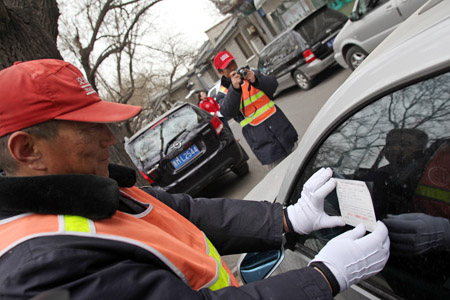-
News >Bizchina
To reduce city traffic, parking fees raised
2011-04-02 14:24
A traffic police assistant tickets an improperly parked vehicle in Beijing on Friday.
[Photo / China Daily]BEIJING - Beijing started charging higher parking fees in non-residential areas on Friday to reduce the number of cars on the city's overcrowded roads.
Parking fees for roadside parking are now 10 yuan ($1.50) for the first hour and 15 yuan for each additional hour. Underground car parks now charge 6 yuan per hour, and off-street parking spaces cost 8 yuan per hour.
The new fees apply from 7 am to 9 pm to parking spaces inside the Third Ring Road and several neighboring business areas.
Roadside parking in other areas inside the Fifth Ring Road have been raised to 6 yuan for the first hour and 9 yuan for each following hour.
Outside the Fifth Ring Road, roadside parking now costs 2 yuan for the first hour and 3 yuan for each following hour, according to the municipal commission of development and reform.
Fees at outdoor and underground parking lots outside the Third Ring Road have also been raised.
Before the hikes, roadside parking cost 10 yuan per hour in 13 major downtown business and shopping areas and 2 yuan per hour in other areas.
Shi Xiangmei, a toll collector in the northern part of the Fourth Ring Road in Chaoyang district, said that she noticed a sharp decline in roadside parking on Friday. "People hardly parked cars this morning, and from 7 am to 1 pm, I collected less than 50 yuan."
Yao Xiaohui, who works in Beijing's Central Business District (CBD), is considering taking public transportation to work instead of driving his car.
"I will have to pay nearly 2,500 yuan a month for parking because of the new fees," he said.
Another driver, a man surnamed Yu, was also thinking of switching to public buses.
"I work for at least nine hours a day, so the monthly parking fee will grow to nearly 3,000 yuan. I can't afford it," said Yu, who works in Xuanwumen.But many raise their eyebrows at the new regulation because problems with the public transportation system, such as insufficient transfer stations in subways and bus service, make it inadequate to meet their needs.
Zhang Zhuting, a member of the Ministry of Transport's legal consulting committee, said: "It is urgent and necessary for the government to establish more cheap parking areas around traffic hubs as connections for people who live in suburbs. Meanwhile, people should also work out the most cost-efficient means of getting to work."
Beijing announced last year that 26 free or low-cost large parking lots would be built near subways and bus stops to encourage drivers to take public transportation from the outskirts to downtown.
"If the new regulation can be applied together with other traffic control measures, I think it will do more good than harm in the future," Zhang said.
Zhao Fengtong, vice-mayor of Beijing, said earlier this year that the city has 940,000 parking spaces, but still needs another 400,000. By the end of last year, Beijing had 4.8 million motor vehicles.
Xinhua contributed to this story
